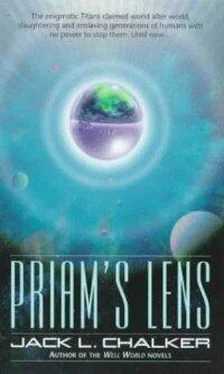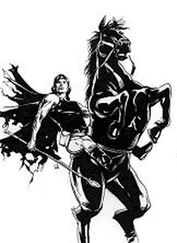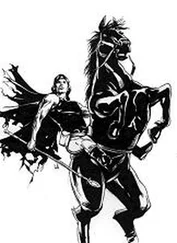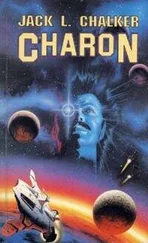Jack Chalker - Priam's Lens
Здесь есть возможность читать онлайн «Jack Chalker - Priam's Lens» весь текст электронной книги совершенно бесплатно (целиком полную версию без сокращений). В некоторых случаях можно слушать аудио, скачать через торрент в формате fb2 и присутствует краткое содержание. Год выпуска: 1999, ISBN: 1999, Издательство: Del Rey / Ballantine, Жанр: Фантастика и фэнтези, на английском языке. Описание произведения, (предисловие) а так же отзывы посетителей доступны на портале библиотеки ЛибКат.
- Название:Priam's Lens
- Автор:
- Издательство:Del Rey / Ballantine
- Жанр:
- Год:1999
- ISBN:0-345-40294-4
- Рейтинг книги:3 / 5. Голосов: 1
-
Избранное:Добавить в избранное
- Отзывы:
-
Ваша оценка:
- 60
- 1
- 2
- 3
- 4
- 5
Priam's Lens: краткое содержание, описание и аннотация
Предлагаем к чтению аннотацию, описание, краткое содержание или предисловие (зависит от того, что написал сам автор книги «Priam's Lens»). Если вы не нашли необходимую информацию о книге — напишите в комментариях, мы постараемся отыскать её.
Priam's Lens — читать онлайн бесплатно полную книгу (весь текст) целиком
Ниже представлен текст книги, разбитый по страницам. Система сохранения места последней прочитанной страницы, позволяет с удобством читать онлайн бесплатно книгу «Priam's Lens», без необходимости каждый раз заново искать на чём Вы остановились. Поставьте закладку, и сможете в любой момент перейти на страницу, на которой закончили чтение.
Интервал:
Закладка:
Priam’s Lens
by Jack L. Chalker
For Eva, Dave, and Steve, as always.
ONE
A Snake in Eden
The trouble with playing God is that the devil keeps popping up and spoiling the fun.
Humanity had grown and matured and finally spread outward to the stars as the dreamers had all hoped. Ancient Earth itself, birthplace of the race, was more a memory than a destination, and the starfields of an entire galactic arm had become the playthings of the new spacefaring race.
It had been a glorious time and, for humanity, a wondrous one, in which nationalism and tribalism had been almost vanquished; there was just “us,” and occasionally “them,” and when “us” met “them,” well, “us” tended to win.
They called it the age of homo in excelsis, the Ascent of Man, master of all he surveyed, the future ever brighter…
And then one day, the Titans showed up, kicked everybody in the ass, and that was that.
Even now, most people didn’t know what those Titans, which was what others called them after a while, really looked like. They’d come from somewhere in the direction of the Zuni Nebula, but almost certainly from far beyond that. They’d come in ships of pure energy that traveled in ways none could comprehend—ships that shone from some inner light and occasionally throbbed or rippled along their energy skins but otherwise did nothing. Ships that looked like nothing less than enormous winged moths of heaven, and they did the most awful thing, the one thing that humanity could neither comprehend nor allow.
They totally ignored everybody.
They didn’t answer any hails, they paid no attention to ships sent to contact them; they simply paid no attention. And when probes were sent, they were simply vaporized, not by conscious action but simply by being in contact with those great ships.
And when, even to get attention, the great weapons had been brought to bear on the newcomers’ huge shining vessels, the weapons had simply vaporized, too. The energy weapons were either absorbed or deflected or simply ignored.
The Titans did, however, like humanity’s planets. They liked them a lot, only they didn’t like them the way they’d been remade.
Helena had been typical of the kind of planets they liked. It had a stable population of almost three billion people when the Titans arrived, and a thriving economy; its primary job of repairing and building great spaceships and refitting the powerful interstellar drives was vital to the continuation of the whole region of planets. Still, nobody there had worked too hard unless they wanted to, there was plenty of recreation, robotics did the heavy lifting, and it was, as was typical of many mature worlds, a pretty nice place to settle down, have families, and live life.
All that life, all that energy, was connected to a vast interstellar empire that made them all proud to be a part of it. This busy hub of activity was right in the center of things and it knew it.
And then the Titans noticed it, and descended on it, and all communication with Helena ceased. In a matter of days, not a single intelligible signal went in or out. Some ships got off and out of there right at the start, but they could tell no one anything about what happened after that. The other ships never rose again, and any ships coming in or near also simply went quiet and off the tracking boards.
It wasn’t that others couldn’t see what was going on there. As usual, the newcomers simply didn’t pay any attention as long as you didn’t get too close, in which case you became part of the project.
The great shining ships simply remade the planet into some sort of personal ideal. They did it as simply as humans could remake worlds in a virtual reality chamber, only they really did it.
The actual method of matter to energy and energy to matter conversion couldn’t be divined; nobody had any instruments that could even measure it. But when it was done a world had been remade into a pastoral ideal. All traces of cities and road systems and any artifacts of humankind simply ceased to exist; even the air tested out as if no industrial activity had ever been there.
Of the people, it was hard to say. Scans showed hundreds of thousands of human beings still down there, having survived perhaps in shelters or cracks or perhaps by design, but there was no way to get to them, no way to find out what sort of life they might be managing in this idealized garden world. They probably would not starve; much of the vegetation was not alien or unknown but rather related to or based upon what had already been there, and the fresh water was probably about as pure as one could imagine.
But now there were millions, widely spread out, where before there had been billions. And they were stuck.
The three large continents of Helena now did have one new artificial thing each, though, to replace what had vanished. On each, fairly close to the center of each land mass, one of the great moth ships had settled and, like the worlds they’d changed, each had metamorphosed into a shining multicolored structure that stretched out for a thousand kilometers, no two exactly alike, all clearly from the same sort of minds.
Minds that were not seen, but minds that had most definitely moved in and stayed. Minds that still allowed nothing out.
Wave upon wave of these new gods, these all-powerful Titans, had swarmed from the direction of the Zuni Nebula; world upon world, system upon system, met the same fate: The worlds were not uniform, but they all were quiet, pastoral, and each had every obvious trace of its former inhabitants removed, even if the Titans left some of those inhabitants there. It was impossible to guess what life down there was like, or whether the humans there now would still be recognized as human, or if they, too, had been changed.
Across the once cultivated fields of the western continent of Helena a figure ran through the incredibly tall grass that now covered the land, so tall and so strong that the winds rippled it like water; a sea, even an ocean, of grass stretched as far as any eye could see.
It was a man, naked, scarred, limping slightly but not from any recent injury, his long hair and flowing beard giving him the visage of a wild beast. He was running through the grass that was taller than he, although he was a big man, barely glancing back, knowing he could see no pursuers in this vegetable ocean and hoping that, for the same reason, no pursuer could see him, either.
He headed for a rocky outcrop that rose from the high plains like an island in the sea, a jumbled mass of boulders and weathered white and orange rock that might have been sculpted by some mad artist. He made for it now as if his life depended on it, made for that outcrop with all the last bits of energy and will he could command, a look of desperation bordering on madness in his face and eyes, his mouth actually slightly foamed.
It was the look of a man who had known for some time that he was to be sacrificed, and who now was desperate to ensure that the sacrifice would not be in vain. Nothing about him indicated any hope beyond that, any sense that he was not in a desperate race with inevitable death.
He reached the base of the outcrop but did not immediately climb up into it. Now was when he was most vulnerable; now was when he had to emerge from the grass, however briefly, and for a moment expose himself to the view of anyone watching. He paused, nervously, tensely, listening, sniffing the air, wishing he had the kind of senses those who were after him so effortlessly possessed and used.
He heard nothing, nothing but the hissing of the gentle but persistent wind rustling the tops of the two-meter-tall grasses, creating the waves and ripples all around.
Читать дальшеИнтервал:
Закладка:
Похожие книги на «Priam's Lens»
Представляем Вашему вниманию похожие книги на «Priam's Lens» списком для выбора. Мы отобрали схожую по названию и смыслу литературу в надежде предоставить читателям больше вариантов отыскать новые, интересные, ещё непрочитанные произведения.
Обсуждение, отзывы о книге «Priam's Lens» и просто собственные мнения читателей. Оставьте ваши комментарии, напишите, что Вы думаете о произведении, его смысле или главных героях. Укажите что конкретно понравилось, а что нет, и почему Вы так считаете.












